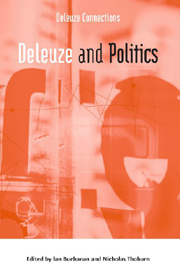Book contents
- Frontmatter
- Contents
- Dedication
- Acknowledgements
- Introduction: Deleuze and Politics
- 1 Power, Theory and Praxis
- 2 Deleuze and the Political Ontology of ‘The Friend’ (philos)
- 3 Molecular Revolutions: The Paradox of Politics in the Work of Gilles Deleuze
- 4 Schizoanalysis, Nomadology, Fascism
- 5 What is a Militant?
- 6 Bourgeois Thermodynamics
- 7 The Age of Cynicism: Deleuze and Guattari on the Production of Subjectivity in Capitalism
- 8 Deleuze, Materialism and Politics
- 9 Becoming-Democratic
- 10 Theorising European Ethnic Politics with Deleuze and Guattari
- 11 People and Fabulation
- 12 Micropolitical Associations
- Notes on Contributors
- Index
11 - People and Fabulation
Published online by Cambridge University Press: 12 September 2012
- Frontmatter
- Contents
- Dedication
- Acknowledgements
- Introduction: Deleuze and Politics
- 1 Power, Theory and Praxis
- 2 Deleuze and the Political Ontology of ‘The Friend’ (philos)
- 3 Molecular Revolutions: The Paradox of Politics in the Work of Gilles Deleuze
- 4 Schizoanalysis, Nomadology, Fascism
- 5 What is a Militant?
- 6 Bourgeois Thermodynamics
- 7 The Age of Cynicism: Deleuze and Guattari on the Production of Subjectivity in Capitalism
- 8 Deleuze, Materialism and Politics
- 9 Becoming-Democratic
- 10 Theorising European Ethnic Politics with Deleuze and Guattari
- 11 People and Fabulation
- 12 Micropolitical Associations
- Notes on Contributors
- Index
Summary
The question of the people, of peoples – la Nation, das Volk, etc. – is not, to put it mildly, in high favour these days. According to prevailing intellectual opinion, to raise or reintroduce this question at the present time can expose you to a charge of unhealthy complicity in the fascism said to be rampant in European and North American societies. Such, it seems, is the price of the ruling anti-globalism, of vigilance and ‘resistance’. And yet the question of the people underlies and over-determines all others. The point at issue is (yet again) nothing less than the meaning of democracy and the future of Western countries.
This surprising need to rethink the concept of ‘the people’ involves a paradox, and it is this that I propose to make my central subject. It concerns the declarations of Gilles Deleuze, his complaint about ‘the missing people’ and his call for ‘a people to come’, as well as the connection he establishes between the people and the ‘function of fabulation’. Take, for example, the following passages (emphasis added to bring out the set of concepts I have in mind): ‘We here come upon what Bergson calls “fabulation” … To catch someone in the act of legending is to catch the movement of constitution of a people’ (Deleuze 1995: 125–6); ‘We ought to take up Bergson's notion of fabulation and give it a political meaning, (Deleuze 1995: 174).
- Type
- Chapter
- Information
- Deleuze and Politics , pp. 218 - 239Publisher: Edinburgh University PressPrint publication year: 2008



